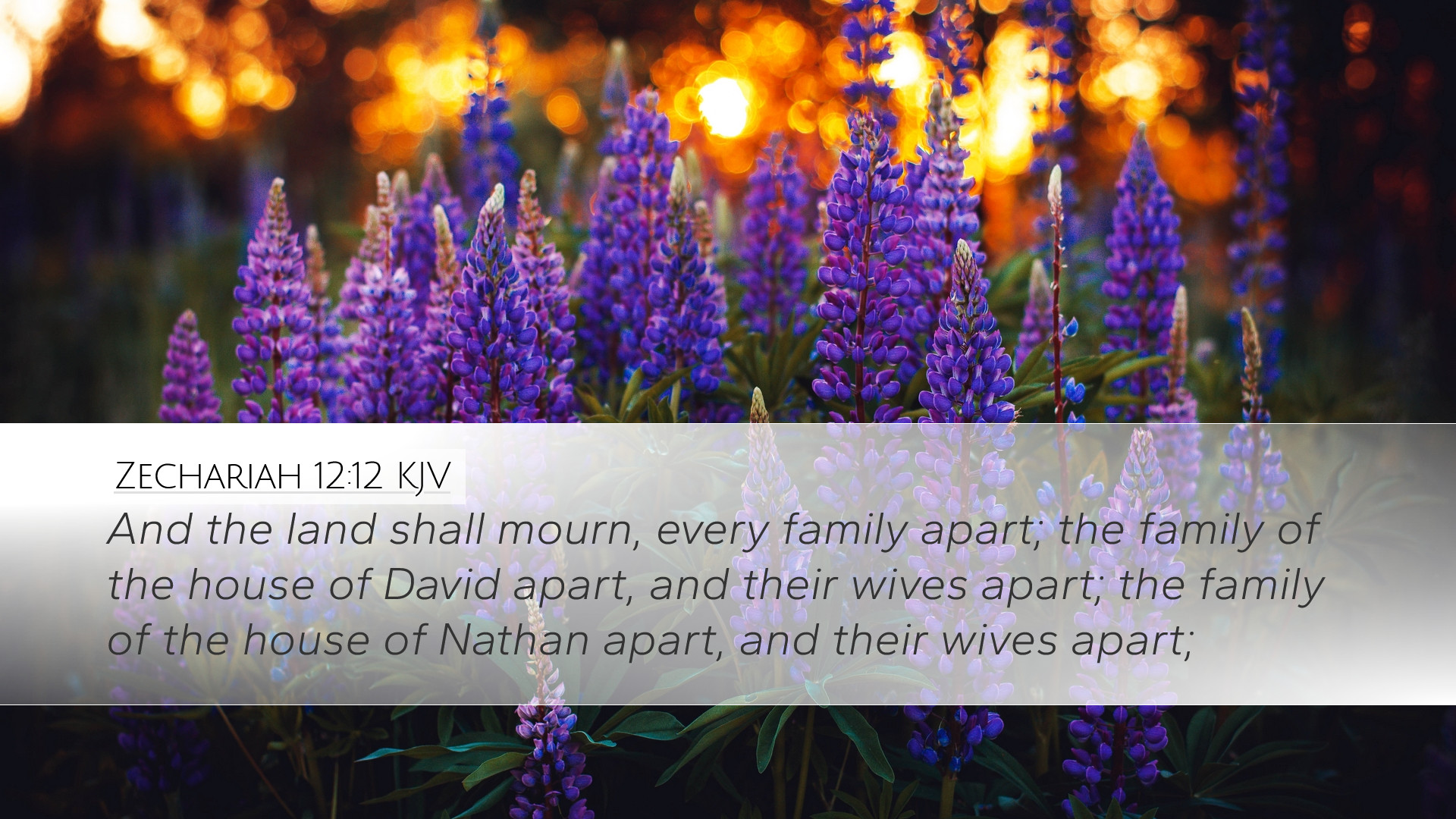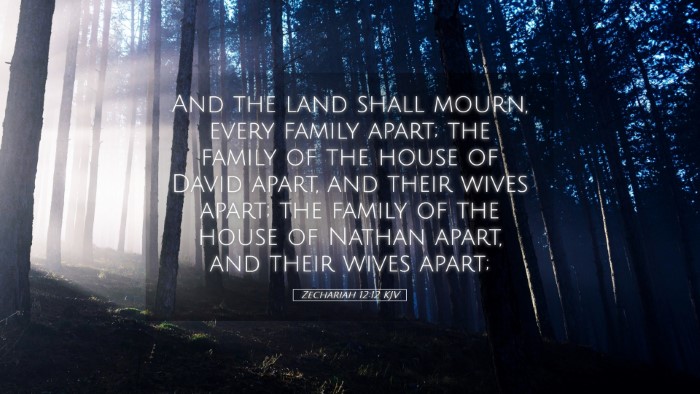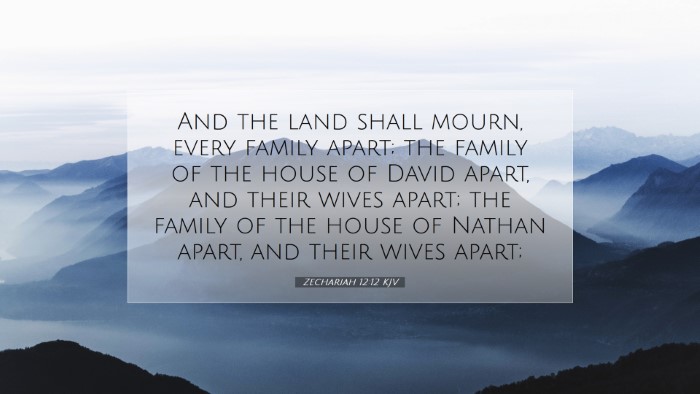Old Testament
Genesis Exodus Leviticus Numbers Deuteronomy Joshua Judges Ruth 1 Samuel 2 Samuel 1 Kings 2 Kings 1 Chronicles 2 Chronicles Ezra Nehemiah Esther Job Psalms Proverbs Ecclesiastes Song of Solomon Isaiah Jeremiah Lamentations Ezekiel Daniel Hosea Joel Amos Obadiah Jonah Micah Nahum Habakkuk Zephaniah Haggai Zechariah MalachiZechariah 12:12
Zechariah 12:12 KJV
And the land shall mourn, every family apart; the family of the house of David apart, and their wives apart; the family of the house of Nathan apart, and their wives apart;
Zechariah 12:12 Bible Commentary
Commentary on Zechariah 12:12
Verse: Zechariah 12:12 - "And the land shall mourn, every family apart; the family of the house of David apart, and their wives apart; the family of the house of Nathan apart, and their wives apart."
Introduction
Zechariah 12:12 presents a significant moment within the prophetic framework of the Old Testament, highlighting themes of mourning, repentance, and the deep connection between the families of Israel and God's redemptive plan. This commentary synthesizes insights from various public domain commentaries to provide a comprehensive understanding suitable for pastors, students, theologians, and Bible scholars.
Contextual Background
The Book of Zechariah is characterized by its apocalyptic visions and prophetic proclamations concerning Jerusalem and the temple. Situated towards the end of the Old Testament period, these messages were directed at a people returning from exile, reopening themselves to the covenant and the promises of God amidst their struggles.
Historical and Cultural Context
The chapter is understood as a response to the crisis of Jerusalem's restoration. As Zechariah prophesies, the people are urged to recognize their sin and to mourn for the one whom they have pierced, indicating a poignant moment of repentance and reconciliation with God.
Exegesis of Zechariah 12:12
This verse speaks of the mourning of the land and its families, an imagery rich with implications of individual and communal grief in the aftermath of sin. The use of "land shall mourn" signifies not just physical devastation but the spiritual barrenness that results from estrangement from God.
Mourning as a Theme
Matthew Henry emphasizes that this mourning is deeply personal and introspective. It signifies the acknowledgment of sin and the sorrow that arises from estrangement from God. Families are identified individually, reflecting both the corporate nature of Israel's sinfulness and the personal responsibility of each household in turning back to God.
According to Albert Barnes, the specific mention of the "house of David" points to the lineage of forgiveness and restoration needed for true leadership among the people. This acknowledgment of need and subsequent mourning is essential for communal healing.
Family Dynamics and Mourning
Adam Clarke notes the importance of familial dynamics in the mourning process. The separation of families in mourning is significant, suggesting a depth of grief that is unique to each lineage. This is both a collective lament and an intimate moment where families reckon with their part in the corporate sin of the nation.
The Significance of the House of David
The "house of David" symbolizes God's covenantal promise and the anticipated Messiah, further underscoring the seriousness with which the nation faces its sin. Each family having its unique mourning portrays not only the individual's recognition of guilt but aims to restore communal faithfulness.
Prophetic Implications
This verse foreshadows a greater revelation of mourning, linked to the fulfillment of prophecy through Christ's coming. The acknowledgment of the families' separate mourning serves as a prelude to deeper spiritual realities and foreshadows the ultimate redemption available to all through repentance.
Theological Considerations
The themes of lament and mourning encapsulated within this verse evoke essential theological discussions about sin, grace, and repentance. Pastors and theologians are encouraged to reflect on how this text applies to the contemporary church as they face their own corporate and personal struggles with sin.
Call to Repentance
This verse serves as a call to remember the weight of sin and the necessity for genuine contrition. The diverse families mourning apart indicates the need for individual repentance that ultimately contributes to collective renewal, urging believers to engage seriously in self-examination and communal confession.
Hope and Restoration
While mourning signifies acknowledgment of wrongs, it also lays the groundwork for hope. The profound sorrow expressed sets the stage for recognition of God’s mercy and the promise of restoration through the coming of the Messiah, highlighting the dual aspects of judgment and grace in God's revelation to His people.
Conclusion
In summary, Zechariah 12:12 serves as a rich text for reflection and study. The themes of family, mourning, and individual as well as communal responsibility resonate profoundly with contemporary believers.
For pastors and scholars, this verse invites an exploration into both the depth of human sorrow connected with sin and the boundless grace offered through repentance and faith in God’s redemptive plan. The focus on distinct families mourning individually emphasizes that while communal identity is significant, individual repentance remains essential in our spiritual journeys.


